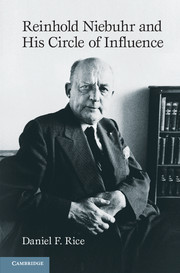Book contents
- Frontmatter
- Contents
- Acknowledgments
- Introduction
- Chapter 1 Paul Tillich (1886–1965)
- Chapter 2 John Dewey (1859–1952)
- Chapter 3 Norman Thomas (1884–1968)
- Chapter 4 Arthur Schlesinger Jr. (1917–2007)
- Chapter 5 Hans Morgenthau (1904–1980)
- Chapter 6 George Kennan (1904–2005)
- Chapter 7 Felix Frankfurter (1882–1965)
- Afterword
- Index
- References
Chapter 4 - Arthur Schlesinger Jr. (1917–2007)
Published online by Cambridge University Press: 05 November 2012
- Frontmatter
- Contents
- Acknowledgments
- Introduction
- Chapter 1 Paul Tillich (1886–1965)
- Chapter 2 John Dewey (1859–1952)
- Chapter 3 Norman Thomas (1884–1968)
- Chapter 4 Arthur Schlesinger Jr. (1917–2007)
- Chapter 5 Hans Morgenthau (1904–1980)
- Chapter 6 George Kennan (1904–2005)
- Chapter 7 Felix Frankfurter (1882–1965)
- Afterword
- Index
- References
Summary
Reinhold Niebuhr’s impact on influential individuals outside the domain of theology included the notable historian and political activist Arthur Schlesinger Jr. Schlesinger’s association with Niebuhr began in late 1940 or early 1941 and continued until Niebuhr’s death in 1971. Schlesinger appeared as a prominent figure in Niebuhr’s life at a time when Niebuhr was making the transition from his earlier socialism to his eventual embrace of a pragmatic realism that found its expression in a position eventually described as “Christian realism.”
Arthur Schlesinger Jr. was a unique historian. He was a historian of the first rank, a strenuous advocate and defender of liberal democracy, a partisan activist in American political life, and, eventually, a presidential assistant and speechwriter in the administration of Democratic President John F. Kennedy. In other words, Schlesinger was both a scholar and a polemicist. This fact led the economist John Kenneth Galbraith to contend that “no one else in our time and Republic quite enjoys such prestige as both an ally and an opponent, and, no doubt, especially the former.”
Schlesinger’s writings were extensive and diverse. His major historical writings include his 1946 Pulitzer Prize-winning Age of Jackson and his three-volume Age of Roosevelt (1957–60); he authored biographies on the Kennedys – A Thousand Days (1965) on President Kennedy and one on his brother entitled Robert Kennedy and His Times (1978); his interpretive-polemical books included The Vital Center (1949), The Imperial Presidency (1973), Cycles of American History (1986), and The Disuniting of America (1991); and he wrote two autobiographies –A Life in the 20th Century: 1917– 1950 (2000), and Journals: 1952–2000, the latter completed by his son and published in 2007.
- Type
- Chapter
- Information
- Reinhold Niebuhr and His Circle of Influence , pp. 113 - 144Publisher: Cambridge University PressPrint publication year: 2012

